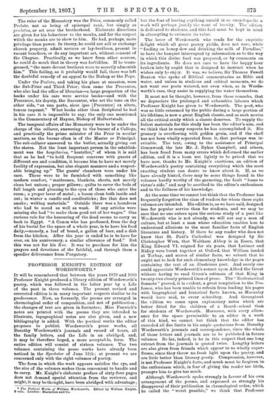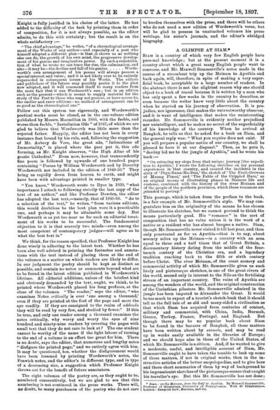PROFESSOR KNIGHT'S EDITION OF WORDS WORTH.*
IT will be remembered that between the years 1879 and 1889 Professor Knight produced a library edition of Wordsworth's poetry, which was followed in the latter year by a Life of the poet in three volumes. The present revised and corrected edition is in many important respects similar to its predecessor. Now, as formerly, the poems are arranged in chronological order of composition, and not of publication ; the changes of text are given in footnotes ; Miss Fenwick's notes are printed with the poems they are intended to illustrate, topographical notes are also given, and a new bibliography is added. With the poetical works the editor proposes to publish Wordsworth's prose works, all Dorothy Wordsworth's journals and record of tours, all the family letters, and the Life in an abridged, and, it may be therefore hoped, a more acceptable, form. The entire edition will consist of sixteen volumes. The two volumes containing the prose works have already been noticed in the Spectator of June 12th; at present we are concerned only with the eight volumes of poetry.
The form in which the work appears satisfies the eye, and the size of the volumes makes them convenient to handle and to carry. Mr. Knight's elaborate preface of sixty-four pages does not demand special attention from the reviewer, and might, it may bethought, have been abridged with advantage;
The Poetical Works of William Wordsworth. Edited by William Knight. 8 vols. London: Macmillan and Co.
but the fear of leaving anything unsaid in so encyclopedic a work will perhaps justify the want of brevity. The edition is dedicated to students, and this fact must be kept in mind in attempting to estimate its value.
The lover of Wordsworth who reads for the exquisite delight which all great poetry yields, does not care, while "feeding on honey-dew and drinking the milk of Paradise," to have the banquet interrupted by information as to the way in which this divine food was prepared, or by comments on its ingredients. He does not care to have the happy hour broken into by aught that is designed to instruct when he wishes only to enjoy. It was, we believe, Sir Thomas Powell Buxton who spoke of Biblical commentaries as Bible and water, and unless in studious and critical moments, we do not want our poets watered, not even when, as in Words- worth's case, they assist in supplying the water themselves.
It must not be thought, however, from these remarks, that we depreciate the prolonged and exhaustive labours which Professor Knight has given to Wordsworth. The poet, who was so little esteemed by the public during a large portion of his lifetime, is now a great English classic, and as such merits all the critical study which a classic deserves. To supply the fullest materials for this study has been the editor's aim, and we think that in many respects he has accomplished it. His granary is overflowing with golden grain, and if the chaff has not been wholly separated from it, that perhaps was in- evitable. The text, owing to the assistance of Principal Greenwood, the late Mr. J. Dykes Campbell, and others, has been freed from many errors which deformed the earlier edition, and it is a boon not lightly to be prized that we have now, thanks to Mr. Knight's exertions, an edition of Wordsworth's poetry containing everything which the most exacting student can desire to know about it. If, as we have already hinted, there may be some things found in the volumes hardly worthy of the garnering, the fault "leans to virtue's side," and may be ascribed to the editor's enthusiasm and to the fullness of his knowledge.
At the same time we cannot but think that the Professor has frequently forgotten the class of readers for whom these eight volumes are intended. His edition is, as we have said, designed less for popular service than for students, and we may be sure that no one enters upon the serious study of a poet like Wordsworth who is not already, we will not say a man of culture, but at least a man whose education enables him to understand allusions to the most familiar facts of English literature and history. If there be any reader who does not know that St. Paul's Cathedral was designed by Sir Christopher Wren, that Waltham Abbey is in Essex, that King Edward VI. reigned for six years, that Latimer and Ridley were burnt together at Oxford, that William landed at Torbay, and scores of similar facts, we submit that he ought not to look for such elementary knowledge in the pages containing the text of an illustrious poet. And surely one could appreciate Wordsworth's sonnet upon Alfred the Great without having to read Green's estimate of that King in twenty-two closely printed lines of prose. The "Ecclesiastical Sonnets" proved, it is evident, a great temptation to the Pro- fessor, who has been unable to refrain from loading his pages with biographical and historical facts known, as Macaulay would have said, to ever schoolboy. And throughout the edition we come upon explanatory notes which are better fitted for the children of a Board - school than for students of Wordsworth. Moreover, with every allow- ance for the space permissible to an editor in a work of this kind, we cannot but think that the editor has exceeded all due limits in his ample quotations from Dorothy Wordsworth's journals and correspondence, since the whole of those letters and journals are to be published in future volumes. So lax, indeed, is he in this respect that one long extract from the journals is quoted twice. Lengthy letters are also given from friends which appear to us wholly super- flavor!, since they throw no fresh light upon the poetry, and are little better than literary gossip. Compression, however, is not Professor Knight's forte, and much must be forgiven to the enthusiasm which, in fear of giving the reader too little, prompts him to give too much.
Although Wordsworth spoke strongly in favour of his own arrangement of the poems, and expressed as strongly his disapproval of their publication in chronological order, which he called the "worst possible," we think that Professor Knight is fully justified in his choice of the latter. He has added to the difficulty of the task by printing them in order of composition, for it is not always possible, as the editor admits, to do this with certainty ; but the result is on the whole satisfactory :—
" The chief advantage," he writes, "of a chronological arrange- ment of the Works of any author—and especially of a poet who himself adopted a different plan—is that :it shows us as nothing else can do, the growth of his own mind, the progressive develop- ment of his genius and imaginative power. By such a redistribu- tion of what he wrote we can trace the rise, the culmination, and also—it may be—the decline and fall of his genius Words- worth's own arrangement of his poems will always possess a special interest and value; and it is not likely ever to be entirely superseded in subsequent issues of his Works. The editors and publishers of the future may possibly prefer it to the plan now adopted, and it will commend itself to many readers from the mere fact that it was Wordsworth's own; but in an edition such as the present—which is meant to supply material for the study of the Poet to those who may not possess, or have access to, the earlier and rarer editions—no method of arrangement can be so good as the chronological one."
Follow out this system too rigorously, and Wordsworth's poetical works must be closed, as in the one-volume edition published by Messrs. Macmillan in 1888, with the feeble, and worse than feeble, "Installation Ode" of 1847, of which we are glad to believe that Wordsworth was little more than the reputed father. Happily, the editor has not been in every
instance fast bound by his rule, and, following the suggestion of Mr. Aubrey de Vere, the great ode, "Intimations of Immortality," is placed where the poet put it, this ode forming, as Mr. Knight observes, "the High Altar of his poetic Cathedral." Even now, however, that transcendently fine poem is followed by upwards of one hundred pages containing "Poems by William Wordsworth and by Dorothy Wordsworth not included in the edition of 1849-50." They bring us rapidly down from heaven to earth, and might
have been with advantage printed in smaller type.
"You know," Wordsworth wrote to Dyce in 1830, "what importance I attach to following strictly the last copy of the text of an author," and like Professor Dowden, the editor has adopted the last text,—namely, that of 1849-50. "As to a selection of the text," he writes." from various editions, this would doubtless be the best plan were it a practicable one, and perhaps it may be attainable some day. But Wordsworth is as yet too near us for such an editorial treat- ment of his works to be successful. The fundamental objection to it is that scarcely two minds—even among the most competent of contemporary judges—will agree as to what the best text is."
We think, for the reason specified, that Professor Knight has done wisely in adhering to the latest text. Whether he has been also well advised in printing the footnotes and annota- tions with the text instead of placing them at the end of the volumes is a matter on which readers are likely to differ.
In our judgment the poetry should be kept as distinct as
possible, and contain no notes or comments beyond what are -to be found in the latest edition published in Wordsworth's lifetime. All editorial additions, unless of the briefest kind and obviously demanded by the text, ought, we think, to be printed where Wordsworth placed his long prefaces, at the close of the volumes. "The reader," says the editor, "who examines Notes critically is ever 'one among a thousand,' even if they are printed at the foot of the page and meet the eye readily. If they are consigned to the realm of addenda they will be read by very few, and studied by fewer." If this
be true, and only one reader among a thousand examines the notes critically, why worry and weary the eyes of nine hundred and ninety-nine readers by covering the pages with small text that they do not care to look at ? The one student cannot be worthy of the name if the light labour of turning to the end of a volume is an effort too great for him. There is no doubt, says the editor, that numerous and lengthy notes " disfigure the printed page," and we entirely agree with him. It may be questioned, too, whether the disfigurement would have been lessened by printing Wordsworth's notes, the Fenwick notes, and the editor's in different type, and in type of a decreasing size, a suggestion which Professor Knight throws out for the benefit of future annotators.
The eight volumes of the poetry are, as they ought to be, -numbered consecutively, bat we are glad to see that this .numbering is not continued in the prose works. There will, no doubt, be many purchasers of the poetry who do not care to burden themselves with the prose, and there will be others who do not need a new edition of Wordsworth's verse, but will be glad to possess in unattached volumes his prose writings, his sister's journals, and the editor's abridged biography.



































 Previous page
Previous page